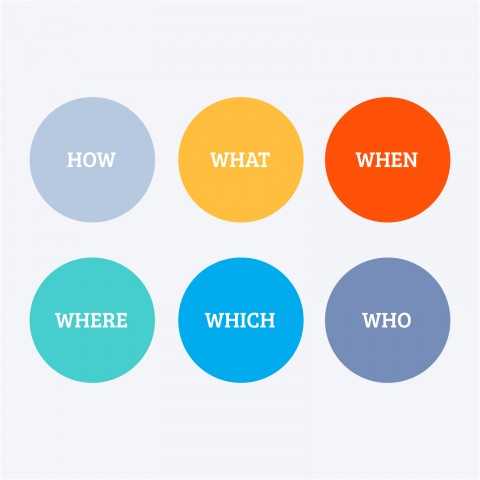
Are you in the Netherlands, wanting to get to know some nice Dutch people, but you don’t know how? Making friends and getting to know people can be hard, especially when you’re in another country. Luckily, there’s an easy way to break the ice: asking questions in Dutch. This is a great way to start conversations—and keep them going.
Through asking questions, you’ll get to know your conversation partner, get personal, and maybe even become friends. And you’ll be able to practice your Dutch listening and speaking skills at the same time!
In this guide, you’ll learn everything about asking questions in Dutch, from the Dutch question words to making yes/no questions. We’ll also introduce you to the ten most common Dutch questions and the different answers you can give. By the end of this article, you’ll not only know how to make questions in Dutch, but also how to answer them!
 Table of Contents
Table of Contents
- The Golden Rules of Dutch Questions
- The 10 Most Common Dutch Questions
- How DutchPod101 Can Help You Learn More Dutch
1. The Golden Rules of Dutch Questions
Before we go to our list of the ten most common Dutch questions, there are some basics you need to understand concerning how to make those questions in Dutch.
A- Questions Beginning with Dutch Question Words

How? What? Why? Where? Who? When?
You know the English ones, so let’s learn more about question words in Dutch!
There’s a special Dutch question structure for questions that use interrogative words at the beginning. The question word comes first, the conjugated verb second, and the subject third:
Question word + Verb + Subject
Let’s have a look at two simple examples:
- Waarom lach je? (“Why do you laugh?”)
- Wanneer trouwt je zoon? (“When does your son get married?”)
Now have a look at more Dutch question words:
| Hoe (“How”) | Hoe voel je je? (“How are you feeling?”) |
| Wat (“What”) | Wat doe je morgen? (“What are you doing tomorrow?”) |
| Waarom (“Why”) | Waarom is je vriendin boos? (“Why is your girlfriend mad?”) |
| Waar (“Where”) | Waar ligt Den Bosch? (“Where is Den Bosch?”) |
| Wie (“Who”) | Wie ben jij?(“Who are you?”) |
| Wanneer (“When”) | Wanneer is zijn verjaardag? (“When is his birthday?”) |
B- Yes/No Questions
Another common question form Dutch people use is the yes/no question; as you know, these are questions that can be answered with a “yes” or a “no.” Questions like this have a different word order, with the verb coming first:
Verb + Subject
For example:
- Kom je? (“Are you coming?”)
- Werkt hij? (“Does he work?”)
As you can see here, the subject and verb are inverted to create yes/no questions.
Remember that when jij or je (“you”) follows the verb, the -t at the end of the verb is dropped:
- Ga je morgen naar school? (“Are you going to school tomorrow?”)
- Instead of: Je gaat morgen naar school. (“You are going to school tomorrow.”)
- Heb je vandaag met je oma gepraat? (“Did you talk to your grandmother today?”)
- Instead of: Je hebt vandaag met je oma gepraat. (“You talked with your grandmother today.”)
- → For more Dutch question examples, don’t forget to have a look at our list of the top 25 questions you need to know on DutchPod101.com.
2. The 10 Most Common Dutch Questions
Now that you know the golden rules of forming basic Dutch questions, it’s time to dive into the ten most common questions in Dutch.

1. How are you?
This basic Dutch question is the most common way to start talking to someone, whether you’ve met before or not.
However, be aware that in the Netherlands, this question isn’t just a formality. In some cultures (such as Spanish or French), someone can ask this question without really expecting a comprehensive answer. This is not so much the case in the Netherlands. When the Dutch ask this question, they’re usually interested in the answer. Of course, your answer may be more or less detailed depending on how well you know the other person.
How are you?
- Hoe gaat het met je? [Casual]
- Hoe gaat het met u? [Formal]
Another informal way to ask this question is: Alles goed? (“Everything fine?”)
Possible answers for this question include:
- ► Het gaat goed met me. (“I am doing great.”)
► Ik voel me niet goed. (“I am not feeling well.”)
► Het gaat wel. (“I am fine.”)
► Ik heb het erg druk. (“I am very busy.”)
As you can see, we used the question word hoe (“how”), followed by the conjugated verb.
As you go through the rest of this article, ask yourself which structure each question uses: the one with a question word at the beginning or the yes/no structure.
2. What are you doing?
If you know someone well and want to know what they’re up to, this question is perfect.
However, it’s not the way to go when talking with strangers, as this random Dutch question can seem quite invasive (especially with the sometimes distant Dutch people).
What are you doing?
- Wat doe je? [Casual]
- Wat doet u? [Formal]
Let’s see some possible answers:
- ► Ik lees. (“I am reading.”)
► Ik kijk een film. (“I am watching a movie.”)
► Ik ben aan het studeren. (“I am studying.”)
► Ik ben aan het koken. (“I am cooking.”)
In the ik ben aan het + verb structure, you can replace the verb (studeren or koken) with the verb that’s applicable to your situation.
- → Would you like to learn some more verbs? Have a look at these 50 most common verbs.
3. What’s your name?

Are you meeting someone new in the Netherlands? Then it’s crucial to be able to ask for their name. This is also a great ice-breaker, as it shows your interest in that person. And once the conversation’s been started, there will be plenty more questions to come!
What’s your name?
- Wat is je naam? [Casual]
- Wat is uw naam? [Formal]
Another way to ask this question in Dutch is:
- Hoe heet je? [Casual]
- Hoe heet u? [Formal]
Let’s now have a look at the answers:
- ► Ik heet Sophie. (“My name is Sophie.”)
► Mijn naam is Sophie. (“My name is Sophie.”)
► Ik ben Sophie. (“I am Sophie.”)
4. Where are you from?
As a foreigner in the Netherlands, you’ll often hear this question. By learning how to ask this question in Dutch, you’ll have the perfect way to stimulate a conversation. While you can ask this to a foreigner, asking this to a Dutch person may help them open up about their hometown or the region they’re from.
Where are you from?
- Waar kom je vandaan? [Casual]
- Waar komt u vandaan? [Formal]
Let’s have a look at some possible answers:
- Foreign answers
► Ik ben Duits. (“I’m German.”)
► Ik kom uit Frankrijk. (“I’m from France.”)
Local answers
► Ik kom uit Amsterdam. (“I’m from Amsterdam.”)
► Ik ben een Rotterdammer. (“I’m a Rotterdammer.” – a person from Rotterdam)
► Ik kom uit Brabant. (“I’m from Brabant.”)
Has your interlocutor given you the name of a place you’re not familiar with? Then you can ask this:
Where is it?
- Waar is dat?
- Waar ligt dat?
- ► In het Zuiden van Nederland. (“In the south of the Netherlands.”)
► Vlakbij Den Haag. (“Close to The Hague.”)
► Het is een stad in Noord-Italië. (“It is a city in northern Italy.”)

- → Have a look at the Dutch name of your country. Can’t find your country on this list? Then check out this extensive list of country names in Dutch.
5. Where do you live?
It’s nice to know where someone is from, but it may be more useful to know where someone is living. Let’s have a look at this common Dutch question:
Where do you live?
- Waar woon je? [Casual]
- Waar woont u? [Formal]
► Ik woon in Breda. (“I live in Breda.”)
► Ik woon in de provincie Groningen. (“I live in the province of Groningen.”)
- → Do you live in the Netherlands, but still struggle with the pronunciation of city names? Then have a look at our major Dutch cities list with audio recordings.
6. Have you been to [place]?
You’ve just told someone where you’re from or where you live. Let’s keep that conversation going and ask if they’ve ever been to that place. This way, you’ll show your interest and get to know more about someone’s (traveling) past.
Have you been to [place]?
- Bent u in [place] geweest? [Casual]
- Ben je in [place] geweest? [Formal]
- → As you can see, this is a yes/no question that starts with the verb, followed by the subject.
Other ways to ask this question are:
- Ben je ooit in Brussel geweest? (“Have you ever been to Brussel?”)
- Heb je door Zuid-Amerika gereisd? (“Have you traveled through South America?”)
Possible answers include:
- ► Ja, ik ken [place] erg goed. (“Yes, I know [place] very well.”)
► Ja, ik ben er vorig jaar nog geweest. (“Yes, I went there last year.”)
► Ik ben er heel lang geleden geweest. (“I was there a long time ago.”)
► Nee, ik ben daar nog nooit geweest. (“No, I’ve never been there.”)
7. Do you speak Dutch?

The language question: another crucial Dutch question for any foreigner in the Netherlands. You’ll receive this question a lot yourself, but learning this structure will be useful for you too. You never know when you’ll need to communicate in your native language or a different common language.
Do you speak Dutch?
- Spreek je Nederlands? (“Do you speak Dutch?”) – Casual
- Spreekt u Nederlands? (“Do you speak Dutch?”) – Formal
- Spreek je Engels? (“Do you speak English?”) – Casual
- Spreekt u Engels? (“Do you speak English?”) – Formal
Let’s have a look at some possible answers:
- ► Ik spreek een beetje Nederland. (“I speak a little Dutch.”)
► Ik spreek vloeiend Engels. (“I speak English fluently.”)
► Min of meer. (“So-so.”)
8. What do you do?

You know how your new acquaintance is doing, you know their name, and you know where they’re from and where they live. You even know the languages they speak. What’s left to ask? A logical followup question is to ask about someone’s work or study.
What do you do?
- Wat doe je? [Casual]
- Wat doet u? [Formal]
If you’re in a bar and you just say Wat doe je? the other person could be caught off guard by this random Dutch question, and answer “I am drinking a beer, why?” So when you ask this question out of nowhere, it may be better to be a bit more specific:
- Wat voor werk doe je? (“What kind of work do you do?”)
- Wat is jouw baan? (“What’s your job?”)
- Waar werk je? (“Where do you work?”)
- Wat voor een studie doe je? (“What kind of study do you do?”)
- Wat studeer je? (“What do you study?”)
- Waar studeer je? (“Where do you study?”)
- → The questions from this point on are in the casual, more common Jij/Je form, but you could make them more formal by using U or Uw.
- → Would you like to learn when to use the formal or casual form in Dutch? Start by finding out what to say when you do business in the Netherlands.
Some possible answers are:
- ► Ik ben politieagent. (“I’m a police officer.”)
► Ik werk in IT. (“I work in IT.”)
► Ik werk in een kledingwinkel. (“I work in a clothing store.”)
► Ik studeer anthropologie. (“I study anthropology.”)
► Ik studeer aan de Universiteit van Amsterdam. (“I study at the University of Amsterdam.”)
- → Not sure how to talk about your job in Dutch? Have a look at our free vocabulary list on Jobs.
9. What are your hobbies?
For the Dutch, their work is important. But many believe that their hobbies and interests define them more than their work. So a great way to show your interest in the other person and find common ground is to ask them about their hobbies.
What are your hobbies?
- Wat zijn je hobby’s?
- Wat doe je graag in je vrije tijd? (“What do you do in your free time?”)
► Ik ga graag naar de bioscoop. (“I like going to the cinema.”)
► Ik hou van wandelen. (“I love hiking.”)
► Ik maak foto’s. (“I take pictures.”)
- → Find your favorite hobbies in our free vocabulary list with audio recordings to practice your pronunciation.
10. Do you like ___?

Let’s get personal and find out what our Dutch acquaintance here likes or dislikes. There’s no better way to get to know someone!
The Dutch are quite direct, and you can usually say whatever you’re thinking. However, try to stay respectful toward your host country. The Dutch don’t mind a bit of criticism, but don’t be too negative or you might hurt their feelings.
Do you like ___?
- Houd je van winkelen? (“Do you like to shop?”)
- Literally, it says “to love,” but in this instance, it’s more similar to the English “to like.”
- Houd je van de Nederlandse keuken? (“Do you like Dutch cuisine?”)
- Houd je van bier? (“Do you like beer?”)
And possible answers:
- ► Ja, ik houd ervan! (“Yes, I love it!”)
► Nee, ik vind het niet echt leuk. (“No, I don’t really like it.”)
► Nee, ik haat het. (“No, I hate it.”)
► Het ligt eraan. (“It depends.”)
- This answer is vague enough to keep yourself out of trouble!
Some other ways to ask this question:
- Vind je Nederland leuk? (“Do you like the Netherlands?”)
- Vind je je werk leuk? (“Do you like your work?”)
- Heb je het naar je zin in Amsterdam? (“Do you enjoy Amsterdam?”)
► Ja, ik houd van Amsterdam. (“Yes, I love Amsterdam.”)
► Ja, maar het is wel erg druk. (“Yes, but it’s quite busy.”)
► Het gaat wel. (“It’s fine.”)
► Nee, ik vind het niet leuk. (“No, I do not like it.”)
3. How DutchPod101 Can Help You Learn More Dutch
In this guide, you’ve learned how to make questions in Dutch, with plenty of example answers to keep that conversation going. You now have the tools to make conversation with your soon-to-be new Dutch friends.
So are you ready to put this useful knowledge into action? Do you feel ready to start asking basic Dutch questions using everything you’ve learned today?
You can start using and practicing these questions with the help of DutchPod101. Boost your studies with our useful vocabulary lists with audio recordings and other free resources.
Would you like to practice with your own private teacher? Then make use of our premium MyTeacher service and get personal one-on-one coaching. Through interactive exercises, pronunciation advice, and personalized feedback, you’ll really master those Dutch questions!
Start asking questions in Dutch (and getting answers) with DutchPod101!










